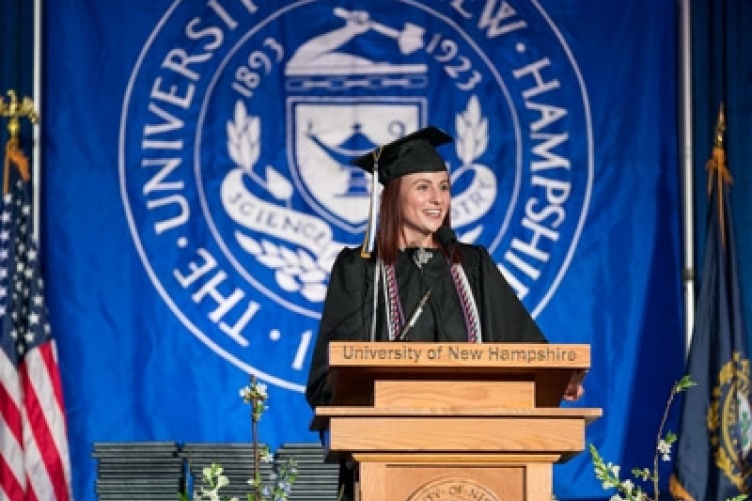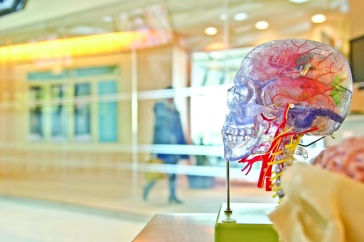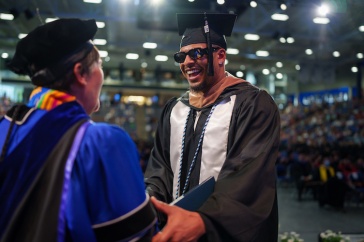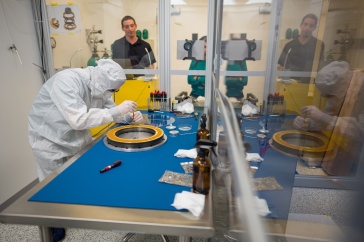
"It doesn’t take a lot of people to make a change. A few passionate people can be just as suitable as an entire army for getting the mission done," said biological sciences graduate Amelia Keane at UNH Manchester’s commencement ceremony on Thursday, May 18.
In the student address, Keane shared her path to UNH Manchester and to the New Hampshire House of Representatives, highlighting the communities that have inspired her along the way.
"Your success is not yours alone,” Keane said. “Your success, while driven by you, is made possible because of those around who help strengthen and guide you: your community.”
The U.S. Army, UNH Manchester and the district she represents—Ward 4 in Nashua—contributed to Amelia’s journey, she said. She encouraged her fellow graduates to embrace and give back to the communities that have shaped who they are, and the new ones they build along the way. Read her full speech below:
"Good evening UNH Manchester class of 2017.
Thank you Dean Decelle for your introduction. I would like to thank President Huddleston, and the distinguished platform party.
I would also like to echo President Huddleston’s words and take this opportunity to also thank the veterans and current service members who are graduating or in the audience today, for their tremendous sacrifice and service to our country. Thank you.
Graduates. I am very sure that there will be no lack of congratulations coming your way. So what I'd like to say to you instead is, work harder.
Because your success is not yours alone. I am going to posit that your success while driven by you, is made possible because of those around who help strengthen and guide you. Your community.
Community drives kinship with others. The 1,400 people in this room tonight are a testament to the support a community brings. I’d also like to thank each one of you in this room for being here tonight and support us. (At grads) It is for all of these people that all of you must work harder.
Your success today is the result of and contributes to a successful community. As such, it is incumbent on you to ensure you, work harder, to give back to your community.
Building and contributing to a community is not easy work. Personally, I have been working on my undergraduate degree for eight years. Through that time I have been a part of, contributed to, taken from, and identified with, various communities. And 8 years later I stand before you a graduate, and as your graduation speaker, it is a tremendous honor but I could not have done it without my communities along the way.
I’d like to take you through examples of communities I identify with, the growing pains sometimes associated with them as well as the wonderful benefits a community provides.
In 2009 after graduating from Nashua High School North, I was on the next plane to fly across the country to attend one of the least known and most revolutionary universities in the world. Soka University of America. You see what makes Soka University so unique and amazing is not just their Tuscan-inspired campus located in sunny southern California. Just a small drive from the city or beach. Just 400 students attended when I was there, 50% of which were international, and represented over 50 different countries.
This school cultivated leadership and social justice activism with a foundation in the Buddhist principles of peace, human rights, and the sanctity of life. The school's name, Soka is a Japanese word meaning ‘create value’. The school attracts the world's most inspiring and eclectic group of students and faculty all charged with the mission of getting an education that will empower you in life to create value in whatever one chooses to do.
After a year and a half I chose to leave that school. The university was amazing, there was no doubt, but financially it wasn’t working out and I had a renewed passion to start on my path to medical school. However the notion of ‘creating value’ in whatever I choose has been my mantra ever since.
So back to NH i flew. I wanted to go back to school but, like so many of you face, I needed to find a way to pay for school and support myself. Just the kind of person an Army recruiter wants to walk into their office.
The Army presented me with an illustrious package which offered; experience and training in the medical field, student loan repayment options, travel, adventure, an infinite amount of opportunity. ‘Be all you can be’ as the saying used to go.
In February of 2012, I took the oath and enlisted into the United States Army Reserve. And on May 1st, just 3 days before my 21st birthday, I shipped off to Ft. Sill Oklahoma for basic training, followed my combat medic school, and nursing school.
The United States military is arguable the largest and most diverse functional unit in the world. These people come from all over the country and in fact the world to join the US military. From every race, socioeconomic class, educational background, culture, and religion. Did you know you the Army recognizes Jedi as an official religion?
When we come together we do lots of training, complaining, and exchanging. We exchange ideas, stories, and any of the good snack from an MRE.
Above all, we come together for the common goal and that is to protect and defend the values, principles, and people of the United States.
It is not always easy to get folks to agree and sometimes a fellow soldier is a complete soup sandwich, but we always manage to complete the mission. We get it done because if the mission fails, we all fail.
I love my Army community like a family. From the folks that I trained with, the people in my unit, other active service members, and veterans there is an inextricable bond.
The mutual understanding and respect between anyone who has ever put on the uniform: embrace the suck (because we’re all in it together), never leave a fallen comrade, you’re only as resilient as your pt belt is bright.
Truly though, it is not anything I have done in the military that makes me proud to serve. I am proud to be a service member because I have the honor of standing beside some of the bravest men and women in the world.
Two years of schooling later, I was back in NH, still on my path to get to medical school.
I began school at UNH Manchester in fall of 2014. I chose our school because in addition to the academic curricula and outstanding faculty, I valued the school for its campus-community. While we are not much of a campus, just a lone mill building, we have the entire city of Manchester as our community.
As such a small community as UNH Manchester, I found it quite easy to get involved. So easy in fact that when I went to inquire about joining a club, I didn’t just join a club, I started a new one. The campuses first environment and sustainability club.
I was passionate, excited, and full of ideas. In fact, prior to the first meeting of my new club I spent hours creating a detailed presentation which broke the club into three subcommittees. I had tasks, goals, plans all laid on it a wonderful schematic. The members would work to carry out activities on campus, in the millyard community, and the greater Manchester community. It was going to be great. And the meeting was great, despite the fact that there was only two students who showed up.
But it doesn’t take many people doesn’t take a lot of people to make a change. A few passionate people can be just as suitable as an entire Army for getting the mission done. After I discovered major issues with our recycling program on campus, my club and I worked to plan, develop, and implement a new recycling program.
To get this mission done we had to forge relationships with other students, members of faculty, staff, all of the wonderful facilities personnel, both interim dean Mike Hickey, and our current dean Mike Decelle, waste management staff, the building property manager, and many more to develop a program that worked for everyone. I am proud to say that in the summer of last year, we officially rolled out our new streamlined recycling program. And it certainly would not have been possible if not for collaboration between all parties involved.
Speaking of parties, that brings me to my third and last story I’d like to share with you. And it has to do with politics. You all remember that election on November 8th, 2016? While that stir on the national level is unparalleled, it was especially important to me because I was elected to my first political office- A NH State Representative.
As a Representative I am tied to many communities. There are fellow Representatives, political activists, volunteers, and most importantly, the community of which I represent. Ward 4 in Nashua. There are two main aspects to run a campaign: fundraising and talking to constituents.
Fundraising may start with “fun”, but trust me it’s not. It’s difficult and awkward and necessary to empower our future leaders to make the changes they see possible in the world. I had to call, email, and text message my friends and family to ask them to donate to my campaign. Fundraising is about the money, but there is something much more that comes out of it. People were actually eager and felt compelled to donate to my campaign it didn’t matter the party we affiliate with. But by giving a donation they instill a trust in me to that I will represent in a manner of integrity and make positive change in the state of NH. No pressure.
Like fundraising, knocking on doors is a daunting yet highly rewarding tool of democracy. I cannot think of a more visceral example of connecting with community than going to the door of a complete stranger on a Sunday afternoon, knocking on their door, to start a conversation about politics. Talk about unpredictable. I represent about 10,000 people in my ward. While I certainly did not have the opportunity to speak to all of those people, I did speak to many, and they all had a story to tell.
There was one conversation I had with a mother that particularly stood out to me. It was one of the first doors I had knocked on. I was still ironing out the wrinkles of my elevator pitch and nervous.
The women who answered the door was a stay at home mother of three young children. While I was prepared and eager to talk about climate change, college tuition, and veterans issues. When I asked the question, “What issues most matter to you?” the mom without hesitation tells me that as a state in the midst of an opioid epidemic she is scared to death about one of her children growing up and falling victim to addiction.
This topic hit extremely close to home for me. I think all in this room knows someone or many people suffering from addiction. We ended up talking on her porch for 30 minutes. And we spoke very candidly about our shared concerns for this issue and experiences surrounding addiction. And we both wanted to work to ensure our community was safe. A 30 minute conversation was enough to make me feel like I had known this person for a lifetime.
We all share something today as well. We are all bonded together as the UNH Manchester community. After today we all go off and become part of novel communities. I challenge you to think about how you interact with your community. Do you give as much as you get? Do you take and fail to give in return?
I view my relationship with my community as symbiotic; like 2 living organisms. We both expend energy to benefit the other and get the same in return. Our survivorship is contingent on a mutual give and take relationship.
We all have a responsibility to be aware of our interactions with our respective communities. Whether it be your neighborhood, your academic community, your religious community, your state, your city, or your country, you have a responsibility to yourself and our future to engage in it. Just like a living organism, our communities can grow and become stronger when tended to properly. However, communities just as living organisms can deteriorate or become frail without proper sustenance and attention.
It is because of my Army family, UNH Manchester campus, the woman and her kids, and many more experiences I have been able to flourish as a young adult.
My fellow graduates, I challenge you to go on and evolve symbiotic relationships with your communities. We will all go on together as wildcats."
















































